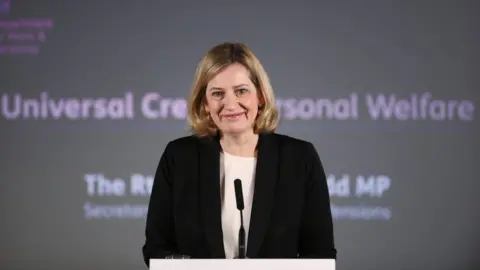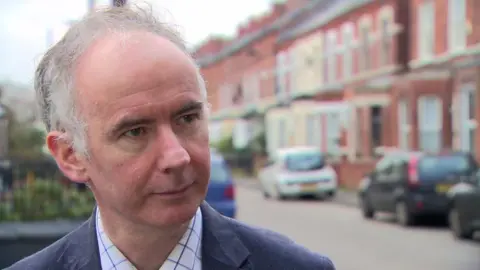Universal credit rollout delayed for existing claimants in NI until 2020
 BBC
BBCPlans to move existing benefits claimants from the old system to universal credit have been postponed in NI for at least six months.
Stormont officials have confirmed that reforms that were due to begin in July have now been deferred until next year.
It follows a raft of changes to the universal credit system in Great Britain announced by Work and Pensions Secretary Amber Rudd this week.
The universal credit welfare reform programme merges six benefits into one.
The government's stated aim was to simplify the welfare system and make it easier for people to get back into work, but critics of the reform agenda have argued that universal credit is pushing more claimants into poverty.
Under the current plans, all existing UK benefits claimants are due to move from the old system on to universal credit by 2023, in a process known as "managed migration".
'Learning opportunity'
Ministers were due to seek Parliamentary approval to transfer another three million people onto the new benefit, but Ms Rudd pushed that vote back and instead announced a pilot programme in which just 10,000 claimants would be transferred.
 PA
PAThe results of that pilot are to be assessed before any other claimant is moved into the new system.
Stormont's Department for Communities, which is in charge of the rollout of universal credit in Northern Ireland, has confirmed that its managed migration programme is also being deferred after Ms Rudd's announcement.
A spokeswoman for the department told BBC Radio Ulster's On Your Behalf programme: "In light of these changes, and to ensure Northern Ireland has the opportunity to consider learning from the pilot in Great Britain, the Department for Communities will not now commence Managed Migration in July 2019.
"Instead, we will defer the beginning of this phase until 2020 and aim to complete by the end of 2023."
The spokeswoman added that Northern Ireland claimants "will not be involved in the managed migration pilot" operated by the Department of Work and Pensions.
'Partial U-turn'
In a speech in London on Friday, the work and pensions secretary scrapped plans to extend the controversial two-child benefits cap to families with children born before 2017.
Ms Rudd also said that universal credit payments will go directly to a household's main carer in a move which is expected to help more women access benefits.
In respect of how the the two-child cap will affect Northern Ireland, Stormont's Department for Communities said it "will mirror any decision made by the Department for Work and Pensions on this matter".
Kevin Higgins from the charity Advice NI welcomed what he described as a "partial U-turn" on the cap, but said it did not go far enough.
"Some families will still be impacted by the two-child cap, so that's still a real concern for us."

Mr Higgins, head of policy at the charity, said the government appeared to have been "forced" into concessions on universal credit.
"It feels like the government has been made to listen," he said.
"It's not that they're listening and being genuinely compassionate and volunteering all of these changes, it's almost like they have to be forced to make these changes."
'Significant milestone'
The rollout of universal credit in Northern Ireland began in September 2017, but initially only applied to new claimants who were not yet in receipt of welfare payments.
That first stage in the process was completed in December 2018 and was described as a "significant milestone" by the Department for Communities.
There are currently about 25,000 people in Northern Ireland in receipt of universal credit, according to Advice NI.
"But to put that in context, there's a total of over 300,000 that will be on it when the whole migration is complete, so there's a very, very long way to go," Mr Higgins explained.
He said many more policy changes need to be made in order to address problems with the new system.
The universal credit reform project is over budget, years behind schedule and has been blamed for exacerbating rent arrears and reliance on food banks.
But the Department for Work and Pensions has argued people are moving into work faster and staying in work longer.
According to analysis by the Resolution Foundation think tank, 2.2 million families are expected to gain under the system, with an average increase in income of £41 a week.
However the same analysis found that 3.2 million households could lose an average of £48 per week.
The Department for Communities told On Your Behalf it "has been working closely with the independent advice sector to prepare customers for the introduction of welfare reform".
"To ensure people have access to support, we have provided funding in the region of £8m to the advice sector to provide advice for claimants impacted by welfare reforms," its spokeswoman said.
